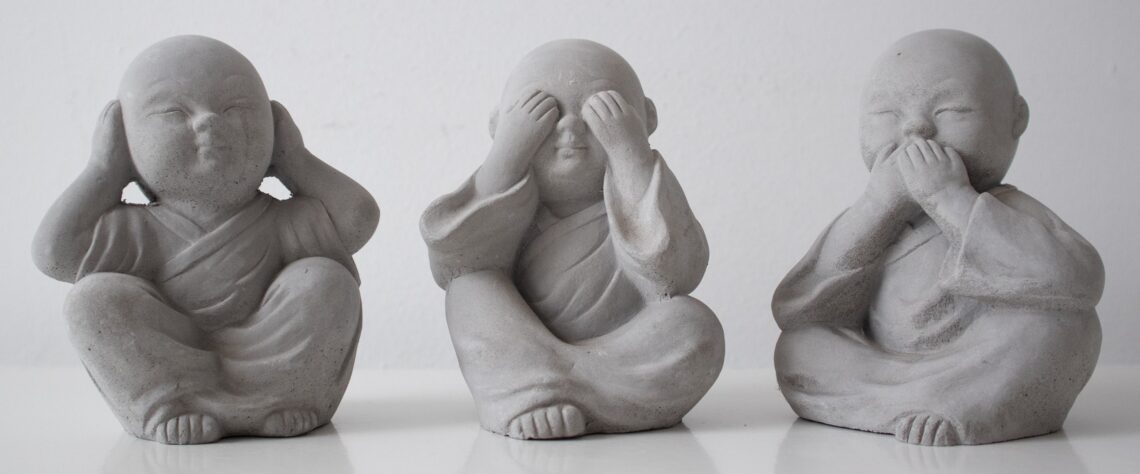
The Curious History of Human Stupidity
I took the title for this piece from a chapter in English writer, Colin Wilson’s 1978 book entitled: Mysteries: An Investigation Into the Occult, the Paranormal and the Supernatural.
I don’t know why, but that chapter title just caught my attention. Can we write a history of human stupidity?
We can’t because stupidity shows itself throughout all times and all people. I don’t think any of us can escape it. The best we can do is trace its sources and then try to eliminate it as much as possible in ourselves. If enough of us can, then maybe we can eliminate a good chunk of it from humanity.
It turns out that the history of stupidity is an individual task. We all have it. We need to see its history in ourselves, and then learn how to overcome it.
So what are the causes of human stupidity? I would say in a nutshell, it is our narrow-mindedness. It is the false belief that we already know what’s what, and nobody can tell us any different. As such our minds are closed to new ideas and new ways of looking at things.
Plato’s Allegory of the Cave
Plato’s famous “Allegory of the Cave” frames this perfectly.
Narrow-Minded False Beliefs
For those unfamiliar with this allegory, it features people sitting in a cave, chained to their seats so that they can’t even turn their heads. All they can see are shadows projected on a cave wall in front of them.
These shadows come from objects paraded in front of a big fire located behind them that they are unaware of.
Since all they know are the shadows these objects cast, they take them to be reality. They discuss and debate them. They argue which came first and second, and which are more beautiful and so forth. They do that because that’s all they know. This represents our narrow-minded false beliefs.
Examining Narrow-Minded False Beliefs
Then one of the prisoners is freed and he looks behind himself. He sees the fire and the objects causing the shadows, and becomes confused. Next, he is dragged up and out of the cave by his liberator. Plato, no doubt, was thinking of his teacher, Socrates. This represents the willingness to challenge our beliefs, beginning our path to wisdom.
At first, when he gets out of the cave he can’t see anything. The brilliant sunlight is blinding him. We have all had the experience of coming out of a dark movie theatre on a sunny day.
The Source of Wisdom
Gradually, his eyes adjust to the light and he is able to see first the shadows, then the objects and finally the sun. He realizes the sun is the cause of everything. He has reached the source of all knowledge (wisdom).
As he gains wisdom, he realizes how limited and closed-minded his previous understanding was inside the cave. It is then, Plato says, the duty of this person is to go back into the cave to liberate the others. This Plato says must be done even with the prospect of death.
Plato realizes that many of us would rather kill our liberator than change our viewpoint.
This sums up the curious history of human stupidity and our escape from it. Now let’s see where this narrow-mindedness comes from, and then how we can escape it.
How We Acquire “Knowledge”
First, we must understand how we acquire knowledge as we grow up.
In the beginning, when we are young, we don’t know anything. We gain knowledge of the world, first from our parents, then from our older siblings and relatives.
Since we have no prior experience to rely on, we just absorb what they tell us as if they are imparting wisdom from Mt. Sinai. What else can we do at this stage? We haven’t yet developed the critical faculty to question ideas.
As we continue to grow, we get influenced by our friends, social media, regular media, our culture, our preachers and teachers and so on. By the time we are well into our teens, we have been programmed like a computer. While most of this programming is unconscious, it still conditions what we think and believe.
Programmed Like Robots
It can even give us the illusion that we know everything; that we have found all the answers. We haven’t. We are just unaware of our programming. We falsely believe we have arrived at these ideas on our own, when nothing could be further from the truth.
In this state, we aren’t free at all, but programmed like robots. The only way we can become free is to slowly pull apart and examine this programming.
Teaching Philosophy, I have had many students at just this stage of development.
How To Overcome Our Programming
So, if most of this programming is unconscious, how do we begin to uncover it? Well, a college or a university is the perfect place to do that. Of course you can do this anywhere if you are diligent enough.
But college and university courses, like philosophy, are ideal because students become exposed to new ideas that challenge their preconceived ones.
I tell my students when you hear me or another student say something that gives you a sharp jab in your ribs, then pay attention. It is telling you that your worldview is being attacked and you don’t like it.
Your immediate reaction might be to strike back, telling the other person how ridiculous their ideas are, saying that no intelligent person would ever believe such nonsense.
If the other person is as programmed as you, then they will strike back with equal force, creating a potentially nasty situation. Nothing good can come of this. Both of you are too hunkered down in your own positions to listen to the other person.
Writ large, this is the cause of many of the wars and conflicts in the world today. It all stems from our inability to question our own beliefs and see things from the another’s perspective.
Opening Our Minds
So, I counsel my students that when they get one of those jabs to the ribs from hearing a viewpoint they don’t like, instead of striking back, take a deep breath and breathe through it. As they are doing this, try to listen to what this person is saying and their reasoning behind it.
Try and be open-minded and see if there is anything in what they say that has some validity. You may still not agree with their position, but if you can find something of value, then you can then preface any response by mentioning this point, and then expressing what aspects you don’t agree with.
Hopefully they can follow the same procedure, turning a potential volatile situation into a learning experience. You might even make a new friend.
This liberation from our programming while initially uncomfortable, is in the end, very liberating.
That uncomfortable stage is necessary as we confront our fears of being wrong, of having our ideas challenged, and of worrying what will become of me if I question all of my beliefs. Who will I be?
Once we move through all that, we can feel the liberation and freedom that comes from thinking for ourselves.
Self-Overcoming
This is a struggle even the most brilliant philosophers, scientists, artists, etc. are continually having.
As the German philosopher, Friedrich Nietzsche said,
“And life confided the secret to me” behold, it said, I am that which must always overcome itself.”
It is a life-long endeavor of continual self-overcoming, but one that is well worth it.
To learn more: Click this link: The Magical Universe.




